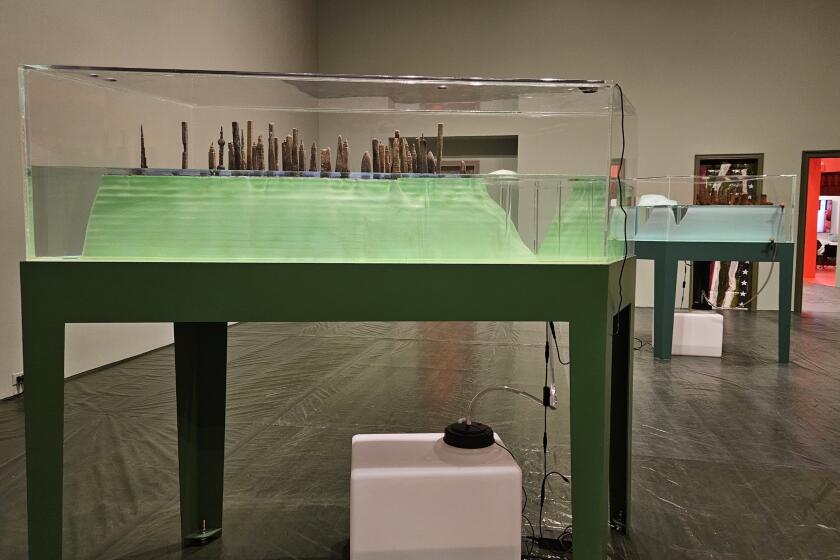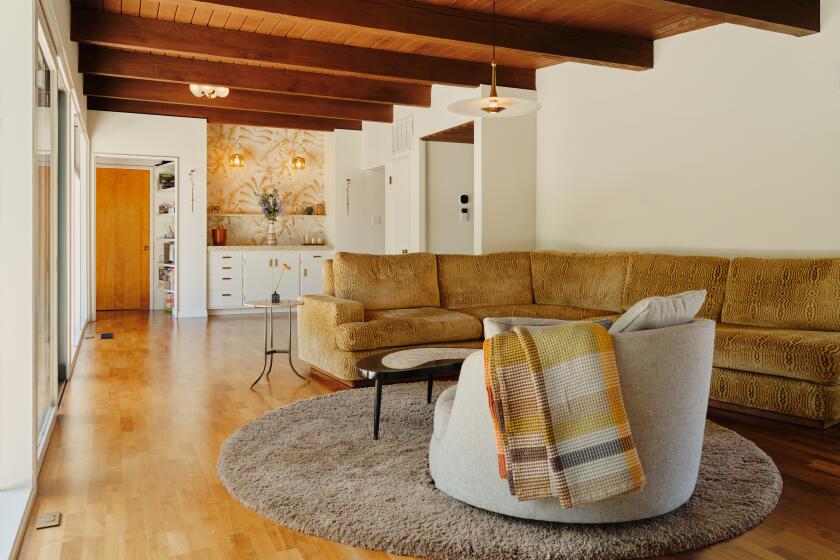Quiet tributes to Messiaen
The 100th anniversary of the birth of Olivier Messiaen, one of the more curious and most influential composers of the 20th century, isn’t until Dec. 10. But the celebrations have enthusiastically begun in Los Angeles, New York and London, to say nothing of Portland, Ore., and, over the weekend, Pomona.
The Pomona College concerts in the Mabel Shaw Bridges Hall of Music -- which included Messiaen’s two best-known works -- appear to have been a coincidence, however. Nothing was made of the fact that veteran pianists Karl and Margaret Kohn played “Visions de l’Amen” on Saturday night and that a new chamber group, pierrot+plus, made “Quartet for the End of Time” the main event of its Sunday afternoon concert. Both concerts were free, no tickets required. The performances were compelling, the venue ideal. But attendance was ridiculously scant, and an opportunity, for the college and the community, was clearly wasted.
The quartet and “Visions” are closely related key works for Messiaen and for 20th century music, and they are full of history. The quartet was given its famous premiere in 1941 in Stalag VIIIA, a German prison camp, by Messiaen and three other notable musicians, all captured French soldiers. The composer played piano. The others were on clarinet, violin and cello.
The instruments were of poor quality. The winter was hard. The 5,000 fellow prisoners who attended the performance were cold and hungry but eager listeners. With an incomparably hopeful paean to birds and the Book of Revelation, Messiaen warmed a freezing room and fed their souls.
“Visions de l’Amen” was the first major work he wrote upon his release a year later. Like the quartet, it lasts about 50 minutes, its several movements taking their inspiration from Roman Catholic mysticism and the composer’s love for birds. The two-piano score adds a third element: eroticism. Messiaen wrote the piece as a duet for himself and his second wife, Yvonne Loriod.
Masters of technique
The amens are to creation, the stars, the angels, the agony of Jesus, the saints, the songs of birds and desire. The final movement is “Amen of Consummation,” which the composer described as “a long chorale of glory,” in which “precious stones of the Apocalypse ring, collide with, dance, color, and perfume the light of life.” The joy of freedom, love and Paris (even an occupied Paris) is palpable in every bar.
The pianists Kohns have been a team since meeting as students at Harvard and marrying in the early ‘50s. That they play as one is, at this point, hardly a shock. That they own the style of the music is also no surprise; they have been important champions of new music throughout their careers. That they retain rock-solid technique in technically demanding music is maybe unexpected.
They began the program with “Prelude and Encounters,” written by Karl Kohn last year as part of a series that goes back to music he wrote for the “Encounters” concerts in Pasadena in the ‘60s and early ‘70s. At one of those programs, Messiaen and Loriod played “Visions.”
In “Prelude,” Kohn alludes slightly to Messiaen’s alluring lush harmonies, but the rhythmically scurrying character of “Encounters” is all his own. In “Visions,” the Kohns followed Messiaen’s lead. The composer fashioned the blunter second piano part, with the masculine themes, for himself. He gave his wife, the more virtuosic player, the greater rhythmic difficulties, along with, he wrote, “all that is velocity, charm and tone quality.”
This is elaborate, wild, voluptuous, sensual, ecstatic music, but the Messiaens, in performance, were chaste and proper. They let the music -- and their relationship -- speak for themselves. The Kohns did exactly the same. They illuminated the score self-effacingly and in the process made one feel that a torch had been passed.
Intense emotion
Sunday’s performance of “Quartet for the End of Time” was also assured and without fuss. The ensemble pierrot+plus -- Mark Menzies (violin), Paula Fehrenbach (cello), Donald T. Foster (clarinet), Gayle Blankenburg (piano) and Kathleen Roland (soprano) -- comes out of a chamber music collective of local musicians that calls itself inauthentica.
Messiaen’s quartet was introduced by three songs from his “Poemes Pour Mi” along with Leonard Bernstein’s early Clarinet Sonata and Shostakovich’s “Seven Romances on Poems of Alexander Blok.” Blissful Messiaen and bitter, fatalistic Shostakovich were temperamentally opposite, and the contrast with the Russian songs, magnificently sung with power and great depths of emotion by Roland, was striking.
All the performances were intense. Foster was as alert to the flickering brilliance of Bernstein’s sonata as he was to Messiaen’s implosion of loneliness in the quartet’s clarinet solo, “Abyss of the Birds.” Strings and piano were satisfyingly intense when necessary. Inauthentica should enliven our chamber music scene.
If the poor attendance in Pomona is to be regretted, Messiaen does draw elsewhere. Next month, pierrot+plus will repeat its program at the Neighborhood Church in Pasadena.
Meanwhile, other performers will tackle “Visions de l’Amen” at the March edition of Piano Spheres and at Jacaranda concerts in Los Angeles and Santa Monica.
More to Read
The biggest entertainment stories
Get our big stories about Hollywood, film, television, music, arts, culture and more right in your inbox as soon as they publish.
You may occasionally receive promotional content from the Los Angeles Times.







